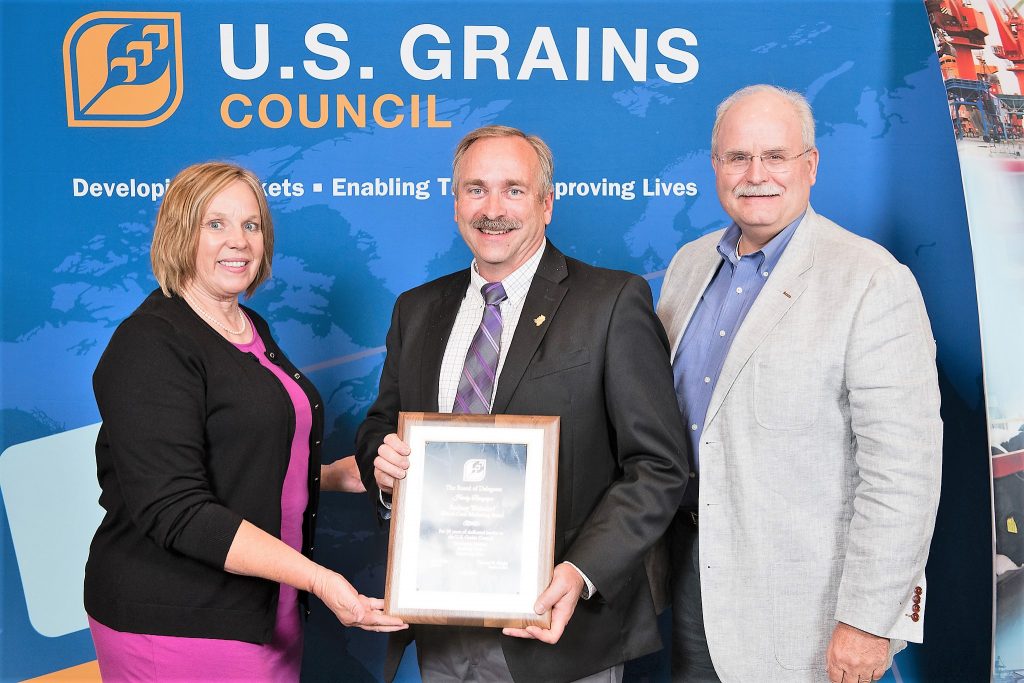Exports are driven not just by supply and demand, but by relationships and communications, according to Rodney Weinzierl, executive director of Illinois Corn. The U.S. Grains Council (USGC) recognized Weinzierl for 30 years of service during its 58th Annual Membership Meeting in Denver, Colorado.
Weinzierl has worked with the Council throughout his tenure with the Illinois Corn Marketing Board and the Illinois Corn Growers Association. During that time, Weinzierl has always believed in the importance of relationships to ultimately make short-term sales and establish long-term customers, likening it to purchasing a car from a dealership one has purchased from before.
“It seems like the buyer of our products is much more interested in the relationship of who they are buying from versus more of a contractual, legal relationship between a buyer and seller,” Weinzierl said. “Our customers seem to be just as interested in relationships as they are with price, which may be a little surprising unless you have had a chance to interact with buyers over the years – whether in the United States or in their home country.”
Facilitating those interactions is part of the value the Council provides to organizations like Illinois Corn, bringing trade teams into the state and offering opportunities for farmers and corn organization staff to travel to meet customers in their home countries. These exchanges lead all parties to better understand cultural, economic and other factors that shape market interactions.
“For being a farm kid in central Illinois, I did not think the world was near as big as it is,” Weinzierl said. “Working for Illinois Corn and partnering with the Council has really expanded my view, and that is what I have tried to pass onto others – just how big the world is and the opportunities we have even though we are a thousand miles from any coast.
“I would have dreamed about it, but I never would have had that experience had the Council not existed.”
In addition to relationship-building, Weinzierl has also noticed accessibility and speed of information transfer have shifted conversations between the Council, its membership, overseas grain buyers and end-users from simply reporting the numbers to providing more detailed explanations of growing conditions and quality in addition to long-term outlooks.
“Communications is so much more accessible to people, whether a mobile phone or e-mail or social media. It is more consistent and casual and almost an ongoing conversation instead of what it was like when I started,” Weinzierl said. “The ability to get close-to-real-time what’s happening allows partners to engage more quickly and from a much more educated standpoint versus a couple of decades ago.”
Thanks to the speed of the information flow and improvements in crop breeding and technology, customers can have a better understanding of quality available from different origins. Weinzierl said information like the Council’s corn quality reports helps buyers better understand the growing conditions that will drive quality each year and helps them frame the questions they should be asking.
“Customers can do a bit more shopping around now and predict a little bit more,” Weinzierl said. “We know more, and because their information is more readily available, there is more opportunity for our buyers to make a better, more informed purchases from wherever they happen to be buying from.”
During his time as a Council member, Weinzierl has also observed how the market for corn has stayed consistent while value-added markets – including for ethanol, dried distiller’s grains with solubles (DDGS) and other corn co-products – have realized some of their growth potential. He also pointed out the diversification in the number of countries buying these products and the role of trade agreements in making that trade happen.
“Trade agreements essentially are that founding platform of what makes them want to be a customer or what allows us the ease of being a supplier,” Weinzierl said. “So anything that will make that easier for them is better for them and better for us.”
About The U.S. Grains Council
The U.S. Grains Council develops export markets for U.S. barley, corn, sorghum and related products including distiller’s dried grains with solubles (DDGS) and ethanol. With full-time presence in 28 locations, the Council operates programs in more than 50 countries and the European Union. The Council believes exports are vital to global economic development and to U.S. agriculture’s profitability. Detailed information about the Council and its programs is online at www.grains.org.

